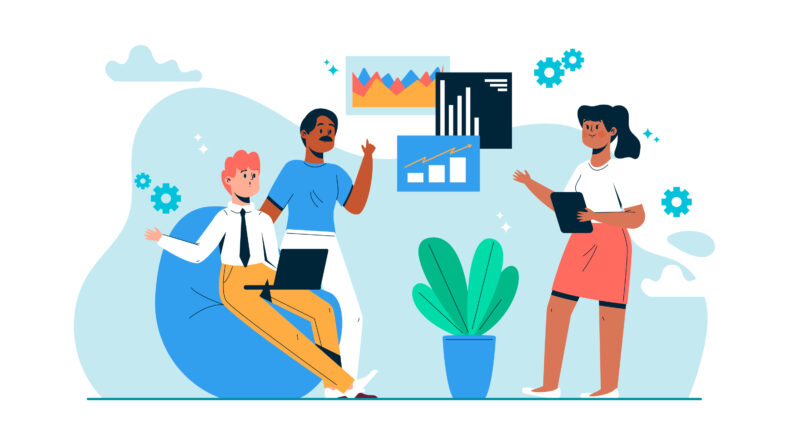The Future of Work: Top 5 Books on Technology Influence on Careers
Introduction
As a result of advances in technology, the way firms and their workers must carry out their work is changing with technology Influence. There is a lack of research data on this subject. This study’s objectives are to present an overview of how technology advancements have impacted work characteristics. And to determine how these advances in Technology on job demands and continuous vocational education and training (CVET).
Numerous academic contributions make theoretical points about the immense potential of new technologies for labour and society. Which sparked a lot of position papers and books. Furthermore, it is still entirely unknown what effects recent technologies, such as using robots, automated systems, or artificial intelligence, will have on specific professions. It was claimed that job duties change as a result of advances in technology. By studying what workplace technologies actually “do” in the workplace.
This is because technologies can now replace specific actions or entire tasks, freeing up time for other activities. The labour duties and the circumstances in which they must be completed characterize jobs. This outlines the skills that are required, or the potential ability to perform a job.
We grow as people in the light of knowledge as we read more technology influence books. Our minds become stronger and have a wider range of capabilities as a result of information. By reading these masterpiece books you can clear all your thoughts and develop your skills as per your interest.
1. “The Industries of the Future” by Alec Ross
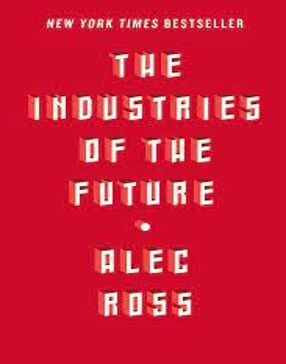
Overview of Alec Ross’s insights on emerging industries and their Impact on careers.
An insider’s view of the developing digital industries is offered by The Industries of the Future. Robotics, genomics, the codification of money into currencies like Bitcoin, and the development of Big Data analytics are just a few of the developing technologies that were formerly viewed as science fiction. The development of personal computers and telecommunications technologies in the latter half of the 20th century laid the foundation for these technical advancements.
By the end of the next decade, many of these changes, such as improved robotics, will start to impact how Americans live. These businesses have so great economic potential. That even the genomics sector is expected to expand to surpass the internet in terms of economic effect. Future industries will also bring us fresh and original difficulties for cybersecurity.
Important Key Takeaways Covered in The Industries of the Future
- Because of the growing volume of digital data and transactions. Cybersecurity will be one of the most crucial policy concerns of the twenty-first century.
- As new business centres emerge, the emergence of these new digital economic divisions has the potential to reshape the world’s economic geography.
- Though Japan presently leads the world in robotics, robots will play a significantly larger part in economies around the world by the end of the next decade.
- Government bureaucracy will find it increasingly difficult to regulate the developing digital economy in the twenty-first century.
- To cope with the changes brought about by new technology, communities must create new possibilities for various demographic groups. And ensure that all students receive the skill set required to flourish in the twenty-first century.
- The Human Genome Project, which was finished in the last decade, has opened up new avenues for the genomic sector.
- Bitcoin and other cryptocurrencies will play a key role in the economy of the twenty-first century.
- Big Data will be the raw material of the twenty-first-century economy, driven by the expansion of digital technologies.
2.“The Future of Work: Robots, AI, and Automation” by Darrell M. West
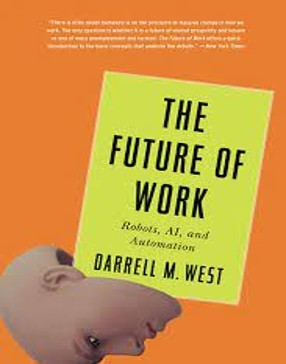
Understanding the role of robots, AI, and automation in reshaping the Future of Work.
The author offers an intriguing look at the most recent innovations: agile robots, smart software, and the “Internet of Things”. Through which common objects connect with one another. He demonstrates how these advances may disrupt established sectors and spawn new ones. Lessening the demand for some occupations while raising the need for others and changing the way people work in whatever jobs they have.
Darrell West’s The Future of Work investigates how rising technology influence will alter our way of life. He offers intriguing perspectives on the future of AI, robotics, and the Internet of Things. There is little question that humanity is on the verge of a huge shift in how we work. The only question is whether the future will be one of shared prosperity and relaxation or one of mass unemployment and upheaval. The Future of Work provides a concise overview of the fundamental principles at the heart of the discussion.
This technology influence book offers a number of suggestions to help people. In dealing with the transition from an industrial to a digital economy. We need to widen the definition of jobs. Include volunteering and parenting, as well as paying more attention to leisure activities. When the “job” no longer defines people’s sense of personal meaning and they engage in a broader range of activities, new kinds of identity will be possible.
Workers will require support throughout their Technology on Careers to learn new skills and create new job capabilities. Political reforms will be required to minimize polarization and restore civility so that open and constructive debate about who is responsible for economic well-being can take place.
Important Key Takeaways Covered in The Future of Work
- As we shift to a digital economy, automation is already displacing workers.
- Artificial intelligence is another component of the digital economy, and it raises some ethical considerations.
- Healthcare and public works will be transformed by the Internet of Things.
- We should redefine jobs to include volunteer labour and other societally beneficial activities.
- We should look to transferrable benefits and lifetime education to facilitate economic development.
- The existing political climate is not conducive to reform, and inaction will exacerbate the situation.
- To prepare for a changing economy, we must implement social and political reforms.
3.”The Fourth Industrial Revolution” by Klaus Schwab
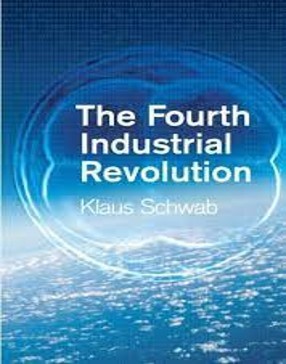
Delving into Klaus Schwab’s concept of the Fourth Industrial Revolution.
The fourth industrial revolution is being propelled by significant advances in material sciences, digital technology, and biology. 3D printing, robots, artificial intelligence, the Internet of things, and neuroscience research, to mention a few, are revolutionizing not only industrial processes but also ourselves as individuals and as a society.
The steam engine, which drove the first industrial revolution, revolutionized the world by replacing muscle power with mechanical power. Electricity and the assembly line enabled mass production in the second. The third was fueled by digital computing and the internet, and it resulted in automated production and the linked society we live in today.
The fourth industrial revolution is characterized by the convergence of technology influence that is erasing the distinctions between the physical, digital, and biological spheres. It has Technology Influence on all aspects of society, not just industrial production. It shifts manufacturing from completely autonomous, intelligent industries to synthetic biology. How we communicate, with ubiquitous and quantum computing, but also threats to privacy and transparency, and how we shape our society, in an era when much human labour is rendered obsolete and can be replaced by machines.
This book is a valuable resource for us in this endeavour. It outlines how technological advances are already disrupting the foundations of industry and society, and it offers a “deep dive” into the 23 main transformations that will occur in the future.
Important Key Takeaways Covered in The Fourth Industrial Revolution
- Three previous industrial revolutions have already reshaped the world, and a fourth is presently underway.
- The fourth industrial revolution is happening faster, wider, and more profoundly than any previous one.
- The latest industrial revolution has created a slew of amazing new physical possibilities.
- This fourth wave of industrialization is characterized by digital and biological tendencies that are rapidly changing our environment.
- These technological breakthroughs are also having Technology Influence on public institutions.
4.“AI Superpowers: China, Silicon Valley, and the New World Order” by Kai-Fu Lee
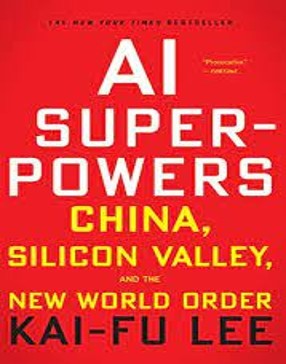
Kai-Fu Lee’s perspective on the competition between China and Silicon Valley in AI.
Kai-Fu Lee worked at Apple “between Jobs” (from 1990 to 1996), building the first speech recognition system 25 years before Siri; he subsequently established Microsoft Research Asia, the “World’s Hottest Computer Lab,” and trained the majority of today’s Chinese AI professionals. He later served as Google China’s president for five years before becoming a venture capitalist and angel investor. He is the only person who understands AI from both the Chinese and American perspectives.
Lee highlights in stunning detail how AI evolved into the formidable force it is today in less than 20 years. And how China is soon becoming the AI world leader? China currently possesses the ideal combination of characteristics required to be an AI superpower. An unwavering entrepreneurial spirit, supporting government policies, well-trained AI scientists, and more data than any other country on the planet.
Silicon Valley’s supremacy is shrinking; China has access to vastly more finance, data, and people resources, and has surpassed the Western world in internet use, online payments, and digital infrastructure. In China, the internet and offline are inextricably linked, giving rise to opportunities and services that appear to us as utopian (or dystopian) science fiction scenarios.
The enormity of this transformation is unprecedented, both in terms of the rate at which it will occur and the implications for our social institutions. Previous technical and industrial revolutions also displaced countless jobs and entire industries, but those transformations took several generations and several years to occur. Instead, it won’t take generations to render truck and taxi drivers obsolete: all we need is a new automobile or a software update.
Important Key Takeaways Covered in AI Superpowers
- At the turn of 2000, China began replicating Silicon Valley things. As a result, many in the West underestimated China’s potential as a competitor. Sceptics, on the other hand, completely missed the mark.
- In his book, Kai-Fu Lee investigates the driving forces behind AI and the path he believes the AI revolution will take. He discusses the four waves of AI arrival and which countries dominated each.
- What matters most is digital China and the consumer side. Digital China’s commercial sector is weak and progressing slowly. In contrast, things move swiftly and there is a lot of data on the consumer side.
- The vastness of China’s markets is not what distinguishes the country. Battle-tested businesses are born from harsh competition.
5.“The Algorithmic Leader: How to Be Smart When Machines Are Smarter Than You” by Mike Walsh
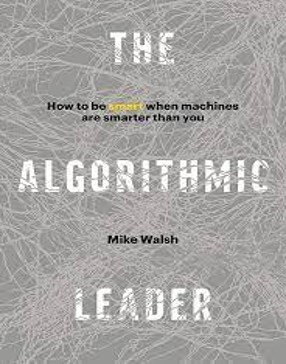
Mike Walsh’s insights into leadership amidst the rise of intelligent algorithms.
The biggest risk we face is not robots taking our jobs, but our inability to rethink ourselves. We live in amazing times, with self-driving cars, gadgets that anticipate what we want, and robots capable of everything from advanced production to complicated surgery.
Automation, algorithms, and artificial intelligence (AI) will revolutionize every aspect of daily life, but are we prepared for the implications for the future of work, leadership, and creativity? While many people are already concerned that robots will take their employment, major developments in machine intelligence present an even more pressing question: what is the real potential of human intellect in the twenty-first century?
Mike Walsh, a futurist and global nomad, compiled years of research and conversations with some of the world’s most successful company executives, artificial intelligence pioneers, and data scientists into a set of ten guidelines for success in the algorithmic age. Walsh brings to life the history and future of ideas like probabilistic thinking, machine learning, digital morality, disruptive technology influence, and decentralized organizations as a foundation for an entirely new approach to making decisions, solving problems, and leading people across different cultures, industries, and timescales.
The Algorithmic Leader provides an optimistic and practical roadmap for leaders of all sorts and companies of all sizes to survive and thrive in this extraordinary time of change. By following Walsh’s 10 fundamental ideas, readers will be able to build their own personal development journey, leverage the power of algorithms, and map a clear route forward – for their business, their team, and themselves.
Important Key Takeaways Covered in The Algorithmic Leader
The Future of work will be progressively robotic, however, this doesn’t intend that there will be no positions for people. But, there will be a more prominent requirement for people who can think inventively, take care of issues, and work with machines.
- Start from the future and work your way back.
- Aim for 10x rather than 10%.
- Consider it computationally.
- Accept the unknown.
- Culture should be your operating system.
Conclusion
The books in this article cover a wide range of topics, from skills to industry knowledge to tips on navigating the next generation of IT. Tryotech shares the books that have revolutionized their lives, from anticipating the future of technology influence to understanding the secrets of leading high-performing teams, all while motivating and engaging them. Add one of these publications to your bedside table or e-reader of choice if you’re about to go on a lengthy flight or simply want to rest while feeding your brain with thoughts.
Also Read
The Future of the Internet: What Will the Web Look Like?
The Next Big Thing in Technology: What Are the Most Exciting Innovations on the Horizon?
